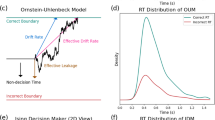Abstract
Contrary to the received view, decision theory is not primarily devoted to instrumental (ends-to-means) reasoning. Instead, its major preoccupation is the derivation of ends from other ends. Given preferences over basic alternatives, it constructs preferences over alternatives that have been modified through the addition of value object modifiers (modes) that specify probability, uncertainty, distance in time etc. A typology of the decision-theoretical modes is offered. The modes do not have (even extrinsic) value, but they transform the value of objects to which they are applied. A rational agent's total set of preferences should be coherent, but from this it does not follow that her preferences over mode-containing objects have to be derivable from her preferences over mode-free objects.
Similar content being viewed by others
Author information
Authors and Affiliations
Rights and permissions
About this article
Cite this article
Hansson, S.O. The Modes of Value. Philosophical Studies 104, 33–46 (2001). https://doi.org/10.1023/A:1010308714135
Issue Date:
DOI: https://doi.org/10.1023/A:1010308714135




